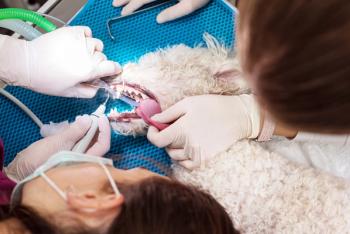
Dog bite prevention: What's your role in the veterinary practice?
You can handle their bark, but you don't want a bite. Firstline Board member Mandy Stevenson, RVT, offers tips for how each team member can stay safe in practice:
Receptionist:
You're usually the first one to see pets that come in. You also talk with clients on the phone and see them regularly for retail purchases, making you more familiar with clients and their pets. So when you schedule appointments, use this knowledge to note patients that might need more space before they visit and be ready when they arrive. For example, you might take the pet straight into an exam room if needed.
Creating a system is helpful to identify these pets throughout the practice. For example, you could put a star on the chart or capitalize the pet's name in the computer system. It's also a good idea to require leashes for all dogs when they're at your practice. Having a leash hook with some of the clinic's complimentary leashes helps enforce this without offending clients. It's also a good idea to be aware of small children in the waiting room, as they tend to walk up to pet dogs that might startle.
Technicians and veterinary assistants:
As a technician, you're in close contact with animals for most of their visit. Always use your restraint techniques and pay close attention to the pet's behavior. Sometimes team members will feel the urge to kiss or hug a dog. Remind them that pets that feel scared or threatened can strike very quickly. Use muzzles when needed and always stay focused on the pet.
This is also when you should monitor the pet owners. Many feel that they should hold their own pets or rub the pet's face during treatment. The pet may mistake their owner for someone else and bite or lunge. So take time to discuss your protocols with pet owners to keep them safe.
Practice manager:
When dogs and their owners enter your clinic, you're responsible for them. Some pet owners may be preoccupied with their pet's illness or injury. When the client's distracted, their nervous pets might strike out at other waiting animals or people. So it's important to talk to team members about how to teach your protocols to clients. Start by helping create and practice protocols for everyone to learn. Ideally this is part of your initial training process, and it's a good idea to review your protocols regularly at team meetings.
Veterinarian:
You're usually the last one to see a patient that may bite, so in most cases your team members can alert you to these pets. Communication is key, so you can sedate or tranquilize pets when needed to minimize the patient's stress and keep your team members safe.
GETTY IMAGES/PAUL BURNS, JON FEINGERSH, RUBBERBALL/JESSICA PETERSON, PASCAL BROZE
Newsletter
From exam room tips to practice management insights, get trusted veterinary news delivered straight to your inbox—subscribe to dvm360.





